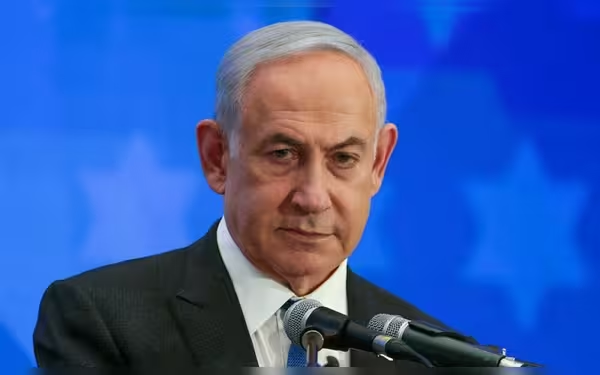Saturday, November 16, 2024 07:48 PM
Israel Challenges ICC Arrest Warrant for Netanyahu
- Israel contests ICC's arrest warrant for Netanyahu.
- ICC prosecutor seeks warrants for Israeli and Hamas leaders.
- Allegations include war crimes and crimes against humanity.
 Image Credits: brecorder
Image Credits: brecorderIsrael officially challenges ICC's arrest warrant request against Prime Minister Netanyahu amid ongoing Gaza conflict.
In a significant development, Israel has officially challenged the request made by the International Criminal Court (ICC) for an arrest warrant against Prime Minister Benjamin Netanyahu. This request, initiated by ICC prosecutor Karim Khan in May, also included Defence Minister Yoav Gallant, who are both accused of committing war crimes and crimes against humanity in Gaza. The backdrop of this situation is the ongoing conflict in Gaza, which escalated following a surprise attack by Hamas on southern Israel on October 7.
According to Oren Marmorstein, a spokesman for Israel's foreign ministry, the country submitted its challenge to the ICC's jurisdiction and the legality of the prosecutor's requests. Marmorstein emphasized that the ICC had not allowed Israel the chance to investigate the claims made against its leaders before moving forward with the arrest warrant requests. This assertion highlights a critical aspect of international law, where the right to self-investigation is often a contentious issue.
The ICC's prosecutor, Karim Khan, has also sought arrest warrants for prominent Hamas leaders, including Yahya Sinwar, Ismail Haniyeh, and Mohammed Deif, on similar charges of war crimes. However, the application for Haniyeh was dropped after his reported death in Tehran on July 31. Meanwhile, Deif's status remains disputed, as Israel claims he was killed in a strike on July 13, while Hamas denies these reports.
As the ICC deliberates on the applications for arrest warrants against Netanyahu and Gallant, the situation remains tense. Khan's office has urged the court to act swiftly, asserting that it has the jurisdiction to address these serious allegations. The charges against the Israeli leaders include severe accusations such as "starvation of civilians" and "intentionally directing attacks against a civilian population." These are grave allegations that, if proven, could have far-reaching implications.
It is essential to understand the distinction between the ICC and the International Court of Justice (ICJ). While the ICJ deals with disputes between countries, the ICC focuses on individuals accused of the most serious crimes, including genocide and war crimes. The ICC is unique in its role as the world's only independent court dedicated to investigating such heinous offenses. However, it faces challenges, particularly in enforcing its arrest warrants, as it relies on member states to carry out these actions.
The ongoing legal battle between Israel and the ICC raises important questions about accountability and justice in international law. As the situation unfolds, it will be crucial to monitor how these developments impact not only the individuals involved but also the broader geopolitical landscape. The implications of this case could resonate far beyond the courtroom, influencing international relations and the pursuit of justice in conflict zones around the world.













